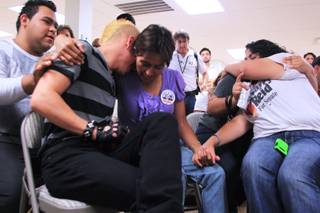
State Sen. Ruben Kihuen hugs Astrid Silva while they gather to listen to President Obama’s announcement of new immigration reforms Friday, June 15, 2012, at the offices of the Progressive Leadership Alliance of Nevada.
Saturday, June 16, 2012 | 2 a.m.
For Astrid Silva, the news came just in time for her 20th anniversary of coming to this country.
President Barack Obama announced Friday that his administration would stop deporting and give work permits to undocumented immigrants who had entered the country as children. It was a gesture of good faith to fire up the Democrats’ Latino base.
It also surprised his political opponents, as well as those in Las Vegas who will soon benefit from the order.
“I had always pictured that I knew how I was going to react when it happened,” Silva said. “You wait so long for something, and then it finally came ... and I felt like I was in a daze. I kept asking, ‘Are you serious? Is this for real?’”
Silva is one of many undocumented immigrants in the Las Vegas area who have come to be known as “the Dreamers.” The name is coined from long-simmering congressional legislation meant to put young, undocumented college students and military enlistees on a path to U.S. citizenship.
Silva’s parents brought her to the United States illegally from Mexico when she was 4 — a start that has prevented Silva from having a driver’s license, Social Security number, passport and an existence free from the fear that at any time, she might be deported.
It’s been a particularly intense waiting game the past several years as Congress has repeatedly fallen short of passing the Dream Act, most recently in 2010, when the measure failed by just five votes.
The Obama administration’s new policy, which offers two-year work visas to would-be Dream Act recipients, doesn’t go as far as that bill.
“This is not amnesty. This is not immunity. This is not a path to citizenship. It’s not a permanent fix,” Obama said in a speech at the White House that Silva and about two dozen others scrambled to watch on television in Las Vegas on Friday. “This is a temporary stopgap measure ... giving a degree of relief and hope to talented, driven young people.”
The Dreamers in Las Vegas didn’t seem disappointed.
“I know that it is a work visa, but that’s something in the right direction; that’s a foot in the door. And that’s what I needed,” said Blanca, a 22-year-old student at UNLV who went to the office of the Progressive Leadership Action Network in Nevada to hear the president’s speech.
Even though Blanca is now guaranteed not to be deported and is likely just 60 days away from a work visa, she still shied away from giving her last name — an old habit to protect herself and her undocumented family, who came to the United States from Mexico when she was just 7 months old.
But as she and her mother Amelia absorbed the news, Blanca couldn’t refrain from slowly planning what the changes would mean.
“It’ll give me the opportunity to finally pay for my own schooling. It will lessen the burden on my parents to pay for my education. I will be the one paying my own tuition ... and it will be perfect because I can save up money for law school,” she said.
Obama’s announcement comes as Congress gears up for another battle over the Dream Act in which Republicans have promised a counterproposal.
Sen. Marco Rubio of Florida, whose pull with the Hispanic community has put him on every Republican vice-presidential shortlist, had promised to produce an alternative Dream Act. His proposal would give undocumented youths conditional permanent resident status but not a green card — enough to stay in the country but not enough to become a citizen.
But Rubio hasn’t filed or released any legislative language. At this point, the difference between his heralded bill and the president’s policy announcement would at most be one of scope. Under Obama’s order, undocumented youths can apply for renewable two-year work visas. Rubio’s proposal would give them the same status without the requirement to renew.
Republicans awaiting Rubio’s legislation, who have voted against the original Dream Act, say that still poses a problem.
“The president has had three years to work with Congress to reform the immigration system and help undocumented children,” said Sen. Dean Heller, R-Nev. “Unilateral action by the administration will not provide a long-term solution to this very serious issue.”
Rubio suggested that Obama’s actions had, in fact, complicated matters for Dreamers.
“By once again ignoring the Constitution and going around Congress, this short-term policy will make it harder to find a balanced and responsible long-term one,” he said.
Democrats in Congress — conscious of how the Dream Act’s destiny depends on the election — adopted a somewhat more optimistic outlook.
“The president can only do so much administratively, and this measure is temporary and limited by current law,” Sen. Harry Reid said. “The onus is now on Congress to permanently fix our broken immigration system, and I call on my Republican colleagues to help us pass the Dream Act along with comprehensive immigration reform that is tough, fair and practical.”
“Congress must pass the full Dream Act for the young people brought to this country through no fault of their own, who have served this nation and contribute to our society,” said Rep. Shelley Berkley, who is challenging Heller for his Senate seat. “Unfortunately, this will never happen with those in Congress like my opponent, Dean Heller, who opposes the Dream Act.”
But the president’s announcement is not expected to sway the entrenched opinions of politicians in Congress as much as the votes of his Latino constituents — a key constituency for Democrats that has exerted make-or-break electoral weight in Nevada.
Many leaders in that community, such as Fernando Romero, who runs the nonpartisan Hispanics in Politics, had been visibly frustrated with Obama’s immigration policy over the past several months. They criticized him for expending more effort racking up deportations of undocumented immigrants than making good on his 2008 election promise to push for comprehensive immigration reform.
In response, Obama argued in several speeches and interviews that it was outside the scope of his power to change the status quo.
“This notion that somehow I can just change the laws unilaterally is just not true,” Obama said last fall. “We are doing everything we can administratively.”
Congress sets the rules for enforcement and establishes the categories and allotment of visas, but it’s the executive branch’s job to determine how they are distributed and applied. That’s what Obama ultimately decided to do Friday — just days before the Supreme Court is set to deliver a ruling on immigration enforcement.
“I’m sad it did take this long, and I’m sad to know that in the interim, so many young men and women were deported while this came about,” Romero said. “But the major point is that it happened. That gives the rest of us a path not necessarily to just continue fighting for the Dream Act, which is something that should have been passed so many years ago, but now it allows us to concentrate on true immigration reform.”


Join the Discussion:
Check this out for a full explanation of our conversion to the LiveFyre commenting system and instructions on how to sign up for an account.
Full comments policy